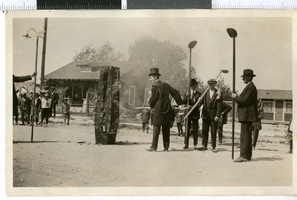Search the Special Collections and Archives Portal
Search Results

Postcard with a photograph of parade participants, Reno, Nevada, 1900-1930
Date
Archival Collection
Description
A postcard of C.P. Moser along with other parade participants burning a casket. Handwritten inscription from behind the postcard, "Celebration, man with pitchfork, C.P. Moser."
Image
Robert Woodruff Photograph Collection
Identifier
Abstract
The Robert Woodruff Photograph Collection (1900s-1970s) consists of ninety-seven black-and-white photographs of locations and events in Clark County, Nevada. Locations include Las Vegas, Henderson, and Searchlight, Nevada, as well as the Hoover Dam. The majority of the images were taken between 1934 and 1962.
Archival Collection
Maurine and Fred Wilson and Dr. William S. Park Photograph Albums
Identifier
Abstract
The Maurine and Fred Wilson and Dr. William S. Park Photograph Albums (1900-1930s) consist of twelve albums containing black-and-white photographic prints and three black-and-white photographic negatives. The photographs are primarily related to the families of William S. Park, John S. Park, and Fred and Maurine Hubbard Wilson. Included are images of the Park homes in Las Vegas, Nevada; Park and Wilson family members; scenes of early Las Vegas, Nevada; outdoor activities, and vacation trips to California, Colorado, and Mexico.
Archival Collection
Wendell Phillips Williams oral history interview
Identifier
Abstract
Oral history interview with Wendell Phillips Williams conducted by Claytee D. White on October 4, 2021 for African Americans in Las Vegas: a Collaborative Oral History Project.
Wendell Phillips Williams discusses his childhood and education in Louisiana before moving to Las Vegas in 1977. Williams talks of his time teaching for the Clark County School District (CCSD), his radio program "Straight Talk" on KCEP's Power 88.1 radio station, the Crystal Apple Award he received as an educator from CCSD, and how he started the now-longest standing Martin Luther King Jr. parade in the United States. Williams shares his passion for Black history and education as well as the bills he championed as a Nevada State Assemblyman from 1987-2001. He also discusses the historical details of how Madison Elementary School was rebuilt and became the Wendell Phillips Williams Elementary School in 2002.
Archival Collection
Willie Thompson oral history interview
Identifier
Abstract
Oral history interview with Willie Thompson conducted by Claytee D. White on November 25, 2019 for the Boyer Early Las Vegas Oral History Project. In this interview, Thompson discusses his early life in Tulsa, Oklahoma and moving to Las Vegas, Nevada in 1995. Thompson recalls the Doolittle Senior Center, the Moulin Rouge Hotel and Casino, and his involvement in the Martin Luther King Jr. parade. Lastly, Thompson talks about volunteering with the Mirage Reading Program.
Archival Collection
Freddy Chavez oral history interview
Identifier
Abstract
Oral history interview with Freddy Chavez conducted by Marcela Rodriguez Campo, Laurents Bañuelos-Benitez, Maribel Estrada Calderon, and Barbara Tabach on February 7, 2019 for the Latinx Voices of Southern Nevada Oral History Project. In this interview, Chavez recalls his early life and childhood in Bolivia, where he was born. Chavez talks about why he left his home country and the experiences he had in Brazil. After spending a few years in Brazil, Chavez came to the United States on a student visa to learn English. He discusses his immigration to Florida and his brief marriage. In 2001, Chavez made his way to Las Vegas, Nevada where he founded the Las Vegas Carnaval International, a parade celebrating Mardi Gras and the cultures that celebrate it. Chavez discusses his experience working with parades and his passion for event organizing, as well as his civic engagements.
Archival Collection
Sands Hotel Public Relations Records
Identifier
Abstract
The Sands Hotel Public Relations Records document the history of the Las Vegas casino and hotel from 1952 to 1977. It is comprised primarily of photographs, mostly 8x10 black-and-white prints, color prints, and transparencies. Most were produced by the Las Vegas News Bureau. Also included are newspaper clippings, brochures, press releases, and inter-office memos relating to the advertising and promotion department. Materials also include reels of 16mm film of the Sands opening, various shows and events including Frank Sinatra and Dean Martin's "Summit Meeting" performances with the Rat Pack, and footage from various television productions filmed at the Sands.
Archival Collection
Stella Champo Iaconis oral history interviews
Identifier
Abstract
Oral history interview with Stella Champo Iaconis conducted by Kay Long on May 14, 1997, May 21, 1997, May 26, 1997, and September 22, 1997 for the Women's Research Institute of Nevada (WRIN) Las Vegas Women Oral History Project. Iaconis opens her interviews discussing her difficult upbringing and life on a ranch in Las Vegas, Nevada with her dad in the 1910s and 1920s. Iaconis then describes her experiences as a waitress in Las Vegas. As the interviews continue, Iaconis discusses Block 16 and sex work, the Helldorado Days, and life in 1930s Las Vegas. Iaconis ends the interview talking about her father and his career as a miner; her many husbands; and her personal history in Las Vegas.
Archival Collection
